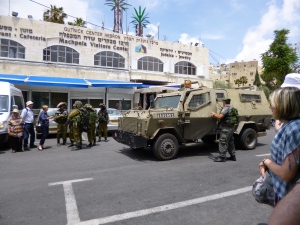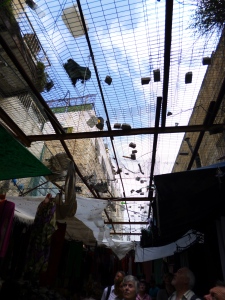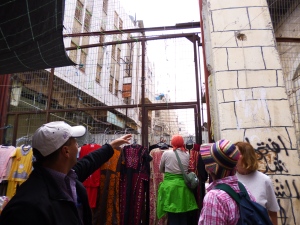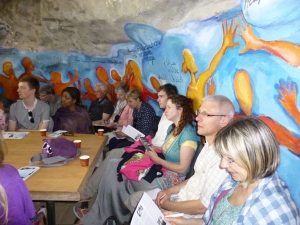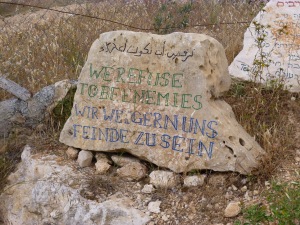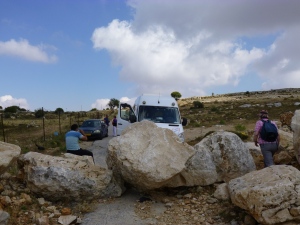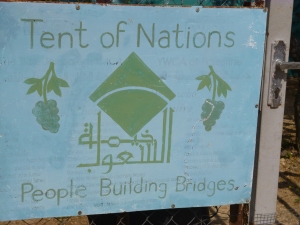This morning we met up with the Methodist Children and Youth leaders group who were also in the area and went to visit Efrata settlement.
https://en.wikipedia.org/wiki/Efrat
This is one of the Jewish settlements built within the West Bank, which are considered illiegal under international law. The settlements are designed to appropriate Palistinian land for Israel and to undermine the possibility of a two state solution since as more settlements are built the land available for a Palestinian state becomes less.
http://peacenow.org.il/eng/Netanyahu_Summary
http://peacenow.org.il/eng/content/what-settlement-watch-team
The settlements are in area C – Palestinian land which is currently occupied by Israel and administered by Israel.
We met Ardi Geldman at the settlement, who is orginally from Chicago. He said that he had not been religious earlier in his life but that he had found himself coming closer to Judaism over time and had recognised a need to live in Israel. Hence he had moved to Efrata settlement in 1985. He said 10, 000 people are now living in the settlement which is named after the Biblical town of Ephratha mentioned in the book of Ruth.
He began to justify the right of Israel to build settlements and occupy land within the West Bank (which is called the Judean Hills by the settlers). Part of this justification is based on a literal interpretation of the Old Testament. Arrdi said that the area was occupied by the Jews until they were overcome by a foreign army 2000 years ago. He said that in AD 70 they had returned to re-establish a Jewish population.
He justified the forecable exclusion of Palestinians from the land by Jews, and the confiscation of Palistinian homes and land by saying that many states in the world had been settled by foreigners Eg. Australia, New Zealand, the USA who had established new regimes, violently forcing out the native inhabitants.
He further stated that in 1948 a two state solution would have been accepted by the Jews but was rejected by the Palestinians. He said that the land had lain abandoned for years except for some subsistence farmers.
When we asked about the check point at the entrance to the settlement, and the claims of the Palestinians that they are not allowed access or to live in the settlements, Ardi said that Palestinian people are able to work in the settlement and to use the medical facilities there. The gates and check points at the entrance to the settlement are there to protect the settlers from suicide bombers such as those who had previously attempted to kill people by detonating a bomb in the local supermarket.
He was asked why the settlement had full-time running water – obvious from the many sprinkler systems and lush grass – while the nearby Palestinian homes had to carry water tanks on the roofs of their houses which they can fill only at certain times when the mains water was switched on for them. He replied that the Palestinian authority did not properly manage the water supplies available to the Palestinian areas.
When asked what he would wish to see in order for the the separation wall to be removed – he said that if he saw Palestinians marching on mass for peace in Palestinian towns he would agree to this.
Reflection
Our meeting with Ardi was in stark contrast to the meetings we had with Palestinians. We came away feeling unsettled and angry – feelings we had not had from other meetings. We did not feel welcomed in the way we had at previous meetings and we were not offered any form of refreshment – even a cup of coffe or water – which was always a feature of Palestinian hospitality. Ardi seemed to be on the defensive from the beginning as he began by telling us that he was going to say things we would not agree with, but that there was no way we would persuade him of another point of view so would have to “agree to differ”. I felt this was incredibly arrogant considering he had not met us or had any idea what our opinions would be.
He was right though that many of us did not agree with his justifications. A member of our group who was from NZ pointed out that it was now recognised that it had been wrong to violently exclude people from their own land and that agreements and reparations had been agreed and apologies made. We should learn from the mistakes of history, not choose to repeat them.
The Zionist position seems to me to exclude part of the biblical story. Although the story in Gensis has the land being given to Abraham God, and the story in Exodus has the Israelites who were liberated from Egypt coming to live in the land, the story that continues is that the people were repeatedly warned of their unfaithfuless and did not become the example to the nations that God had wanted (see 1 and 2 Kings for example). The prophets – Amos, Jeremiah etc, predicted their downfall which came when many were carried off to exile in Babylon ie. the land once given was now taken away.
Even that interpretation though requires a literal approach to be taken to the Bible rather than an approach which interprets the text for each generation. Scholars now believe that Genesis was not written until after the exile. It also ignores the fact that history is never as complete as it seems. In any invasion there are always those who continue their lives virtually unaffected – this was the case in England during the invasions of Romans, Saxons and Vikings. Many were displaced but many remained. This was also no doubt the situation in Palestine also over many different invasions by different people – Jews, Muslims, Crusaders, Ottomans and so on. I therefore think that the Palestinians have as much right to their homes as anyone else.
From the settlement we drove to HEBRON.
We learned that Hebron is divided into two zones – H1 – under Palestinian control, and H2 under complete Israeli occupation.
The 5000 or so Jewish settlers who reside in Hebron make life very difficult for the Palestinians. The main shopping street has been appropriated by the Israeli authorities and closed off including all shops and services. Some shop doors were welded shut by the IDF with the goods still inside. Palestinians are no longer allowed on the road except in a few cases for direct access to homes.
There are many shops and stalls still in Hebron, but not so many people to buy and many children desperately trying to sell things on the street. Some streets had wire mesh grills overhead – this is apparently because the Jewish settlers throw rubbish and other nasty things down upon the Palestinian people below (you would have thought they would have more self-respect than to act in so uncivilised a way). There are guard towers with armed guards, but they are not there to keep the peace and do not act to prevent the Palestinians being attacked or intimidated by the Jewish settlers. Their purpose is to protect the Jewish settlers.
We stopped at the women’s co-operative to buy souvenirs – scarfs and wall hangings.
We passed through a turnstile, administered by armed guards, to enter the Tomb of the Patriarchs – the tombs of Abraham, Sarah. We entered through the Muslim Mosque – but the other side is a Jewish synagogue with a separate entrance. Julie was annoyed at being given a covering gown to wear as she entered the mosque as she thought she had taken trouble to ensure she was properly covered with her clothing.
After visiting the mosque we were given lunch on the roof top of the home of a Palestinian family. We were served chicken and rice with salad. We noticed the difficulties faced by the family who had not had running water for 30 days, although the Israeli property next door had no such issues.
Israeli soldiers were present in the street here and an armed carrier passed by.
After lunch we drove to the “Tent of Nations“:
This is a mountain situated between two other mountains on which Jewish settlements have been built. The mountain has been in the same family for generations and the family have documents showing their ownership from the days of the Ottoman Empire, and also documents from the British mandate, the Jordanian period of administration and the Israeli government from 1948. This has not stopped the Israeli’s trying to appropriate their land however and they have been to court 15 times so far to state their claim – this involves them in having to meet ongoing legal costs.
The family is also unusual in that they live on the land – in a cave because the Israeli authorities will not allow them a building permit and have even put demolition orders on their tents! Most Palestinians did not traditionally live on their land but lived in the local village community – going to farm their land during the day. Many did not register with the various occupation administrations in order to avoid having to pay taxes. Israel use this weakness to deny their ownership of their land and appropriate it for the state even though the family may have lived and farmed there for generations. The grandfather of this particular family however lived in a cave on the land.
The land is still under threat as the Israelis continue to try to intimidate the family to leave. Once when the family went to church in Bethlehem at Christmas, they returned to find settlers bringing a bulldozer onto their land. The access road has been blocked by the Israeli authorities by placing large boulders across it. The government even offered them a blank cheque to buy the land but this was rejected as for the family it is a matter of honour to hold the land in trust for future generations.
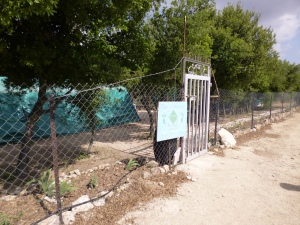
These tents are used to house visitors to the Tent of Nations. They have been served with demolition orders!
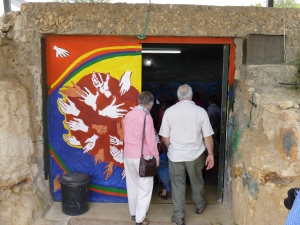
This is the entrance to a cave which has been turned into a conference room – part of the imaginiative way that the family are trying to keep their land from being taken by the Israelies.

